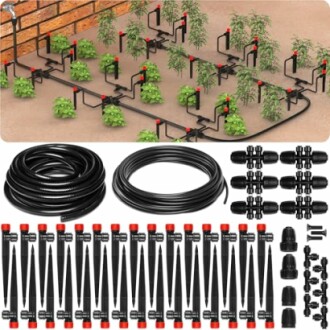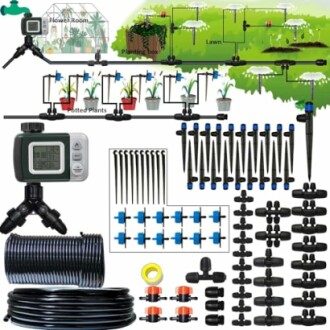
Best Practices for Effective Garden Irrigation
Key Takeaways
- Understanding the different types of irrigation systems is crucial for choosing the right one.
- Drip irrigation systems are efficient for deep watering and saving water.
- Regular maintenance of your irrigation systems can prevent costly repairs and ensure longevity.
- Climate and soil type greatly influence the choice of irrigation method.
- Automation systems can significantly reduce workload and ensure optimal watering schedules.
Garden irrigation is a vital component of garden care, especially in regions where rainfall is sparse. Having an effective method for watering your plants can not only help ensure their health and growth but also conserve water. In this guide, we’ll explore various irrigation methods, discuss how to select the best one for your garden's needs, and provide tips on maintaining your systems.
Understanding Different Irrigation Methods
There are several common methods for irrigating gardens, each with its unique benefits and considerations. Below, we break them down into a concise table:
| Method | Pros | Cons |
|---|---|---|
| Drip Irrigation | Efficient use of water, minimal evaporation, directs moisture to roots. | Initial setup can be more complex. |
| Sprinklers | Covers a large area, easy to install. | Can lead to water waste due to evaporation and runoff. |
| Soaker Hoses | Simple to use, delivers water directly to soil. | May require hoses to be buried or covered with mulch. |
| Manual Watering | Low cost, completely controlled. | Time-consuming, inconsistent watering. |
Choosing the Right Irrigation System
When selecting an irrigation system, several factors come into play:
- Garden Size: Larger gardens often benefit from automated solutions, while small plots may use simpler systems.
- Plant Types: Different plants have varied watering needs; understanding these helps in choosing the correct method.
- Soil Type: Sandy soils drain quickly and may require frequent watering compared to clay soils.
- Climate: Know your local weather patterns; regions with low rainfall may need more efficient systems like drip irrigation.
Featured Products for Efficient Irrigation
Enhancing your irrigation strategy can be made easier with the right products. Here are some highlighted systems:
CARPATHEN Drip Irrigation System
Upgrade your watering routine with this adjustable drip irrigation system, designed for gardens up to 130ft to ensure efficient moisture delivery where it's needed most.
More DetailsDrip Irrigation System with Water Timer
An automatic watering solution that covers large areas efficiently, making it a perfect addition to both gardens and greenhouses.
Explore NowMaintaining Your Irrigation Systems
Regular maintenance is essential for the longevity and efficiency of your irrigation systems. Here are some tips:
- Check for leaks in hoses and connections.
- Clean filters and emitters to prevent clogs.
- Inspect and adjust sprinkler heads to ensure even coverage.
- Flush your system at the beginning and end of the watering season.
Automation: The Future of Garden Irrigation
Automated irrigation systems can save both time and water. They allow you to set specific watering schedules that can be adjusted based on weather and plant needs. Consider investing in smart irrigation controllers that integrate with weather data.
Conclusion
By carefully selecting the right irrigation method for your garden and maintaining your systems well, you can foster a thriving outdoor space while conserving water. Whether you choose a drip irrigation system for efficiency or sprinklers for coverage, understanding your garden's unique needs will lead to better results. Explore more about innovative irrigation solutions and find out what fits your gardening style best!
Tips for Beginners
- Start small to understand what works best before expanding.
- Invest in quality products instead of going for the cheapest options.
- Keep an eye on your plants’ health and adjust your watering habits accordingly.
- Don't hesitate to seek advice from local gardening clubs or resources.

